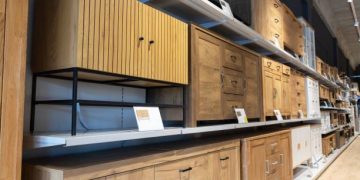The U.S. homebuilding and furniture industries are preparing for significant changes following the announcement of new tariffs on imported kitchen cabinets, bathroom vanities, and furniture. The policy, set to take effect October 1, will impose a 50% tariff on cabinets and vanities and a 30% tariff on upholstered furniture.
Industry experts warn the measures could increase costs for both builders and homeowners, especially amid an ongoing housing shortage.
Katie Crook, owner of Heritage Cabinetry and Design in Santa Barbara, California, noted that international products often feature unique qualities not easily replicated by domestic suppliers. “European oak, for instance, has a tighter grain and greater durability, while Italian kitchens carry a distinctive ultramodern design,” she explained. Crook believes the tariffs may not lead to an immediate production shift to the U.S., but they will likely add pressure to homeowners seeking imported products.
John Buscarello, an instructor at the New York School of Interior Design, expressed concern over the broad impact on renovation projects. “This change hits the entire market, from big-box stores like IKEA to luxury installations costing hundreds of thousands of dollars,” he said, adding that costs may cascade to contractors, plumbers, and electricians if homeowners delay projects.
Trade organizations are closely monitoring the development. Bill Darcy, president of the National Kitchen and Bath Association, which represents more than 55,000 members, said the group remains committed to supporting global partnerships while navigating challenges. “Our members are resilient, and we continue to focus on areas where they can succeed,” he stated.
Major retailers are also assessing the situation. Sarah McDonald, a spokesperson for Home Depot, said the company would evaluate the tariffs once full details are released, while affirming its commitment to keeping prices accessible for customers.
In regions like California, where many households are still rebuilding after wildfires, the added costs could be especially difficult. Crook emphasized that premade cabinets and vanities, often sourced globally by big-box stores, will become more expensive for homeowners.
Some manufacturers and designers see opportunity in the shift. Katie Rosenfeld, who founded Vanity & Co. near Boston to revive U.S. production of high-end handmade vanities, noted that interest in her American-made products may grow as tariffs increase demand for domestic alternatives.
Observers also expect legal challenges from manufacturers questioning the legality of the tariffs. Buscarello cautioned that homeowners and builders cannot easily prepare, given that cabinetry requires custom orders and lead times.
While uncertainty remains over the long-term effects, many in the industry agree the new tariffs will reshape the cabinetry and furniture markets, influencing costs, design choices, and sourcing strategies across the U.S.
#SupplyChainNews #TradePolicy #TariffUpdate #Homebuilding #FurnitureIndustry















